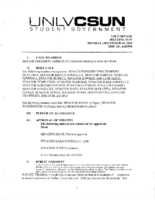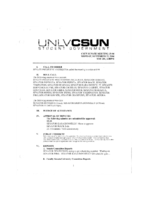Search the Special Collections and Archives Portal
Search Results

Transcript of interview with Judy Jetter by Lisa Gioia-Acres, September 10, 2008
Date
Archival Collection
Description
Judy Jetter, a devout jazz music enthusiast, was born in a Chicago suburb in 1939. At the age of three, Judy began taking acting as well as tap and ballet classes. While raised by her mother until age 15 Judy was forced to study opera even though jazz music was her passion. Her first introduction to jazz came while listening to, legendary jazz great, Woody Herman on the radio. Judy developed an instant appreciation and love for jazz music. While working as a commercial actress during her childhood - Super Circus and Peter Pan peanut butter - Judy experienced live performances by the Stan Kenton Orchestra and was completely amazed. After graduation Judy was married and gave birth to her son. She worked for a movie studio in Chicago doing various jobs such as cleaning the stage, typing scripts, model work, and even playing the role of housewife. Later Judy went to college and earned a degree in psychology, which led to a job as a therapist. However, after remarrying to Bill Jetter, Judy switched careers and soon became an exercise instructor at the YMCA. There she cultivated her passion for working with people who suffered from disabilities. In particular, Judy developed a water regiment specifically designed for people with disabilities. Judy would go on to share her experiences in this field in two subsequent book publications. Unfortunately Judy's husband passed away with cancer. However, Judy found refuge and support from a group of jazz enthusiasts. Alongside her cadre, Judy began really studying how to listen to music. She moved to Las Vegas in 1992 and can often be found at different jazz venues throughout the city. She enjoys the local jazz scene in Las Vegas and making her weekly rounds to take-in Big Band and jazz singers such as Jobell and Terri James, as well as going to see Bruce Harper playing at Bugsy's, and the talented Gus Mancuso performing at the Bootlegger. Judy believes that music, like everything else, has evolved and will continue to mature; however, jazz musicians such as Louis Armstrong still remain as the foremost contributors in the long history of jazz music. Her hope is that music and the arts will continue to be offered through education to allow the next generation another "dimension to not only their education but their soul."
Text

Jocelyn Cortez interview, March 18, 2019: transcript
Date
Archival Collection
Description
Interviewed by Nathalie Martinez. Jocelyn Cortez is a Salvadoran-American immigration lawyer. She grew up on the Eastside of Las Vegas and grew up going to school in the Clark County School District and at UNLV before going to Law School at the University of Arizona. She is an engaged community member as an immigration lawyer working alongside the Culinary Union and the Latino Bar Association.
Text

Transcript of interview with Betty and Gus Ciliax by Connie Boich, March 2, 1977
Date
Archival Collection
Description
On March 2, 1977, collector Connie Boich interviewed Betty (born March 31, 1919 in Bisbee, Arizona) and Gus Ciliax (born May 13, 1909 in Michigan) in the Ciliax home in Las Vegas, Nevada. This interview covers Southern Nevada and early development of the area. During the interview, they also discussed local recreation, prostitution, Block 16, and various social activities, in addition to local businesses, such as Six Companies, the economy, Boulder Dam, and education in Nevada.
Text

Transcript of interview with Betty Ham Dokter by Roger Jablonski, February 27, 1977
Date
Archival Collection
Description
On February 27, 1977, Roger Jablonski interviewed Betty Ham Dokter (born 1922 in Las Vegas, Nevada) about her life in Southern Nevada. Dokter first talks about her upbringing and education in Las Vegas before describing church activity and the first casino properties that were built. She later talks about presidential visits, economic changes in Nevada, the construction of Hoover Dam, and some of the social changes in Las Vegas. The latter part of the interview covers the topics of racial minorities, environmental changes, early grocery stores and movie theaters, and social clubs. The interview concludes with a brief discussion on Mt. Charleston.
Text

Transcript of interviews with Louis Wiener, Jr. by Eleanor Johnson, January-February, 1990
Date
Archival Collection
Description
In this multi-part interview, Louis Wiener, Jr. discusses coming to Las Vegas from Pittsburgh at a young age, attending Las Vegas High School and University of Nevada Reno. He attended law school at University of California at Berkeley and passed the Nevada State Bar in 1941. He established a practice, Jones, Wiener and Jones, with Bob Jones and Cliff Jones and later with Herb Jones. He had another practice with Neil Galatz and Dave Goldwater, retiring in 1988. Wiener had other business ventures that allowed him to do pro bono work as a lawyer. Wiener discusses his family, including former spouses, his children, and various aspects of his career as an attorney in Las Vegas, representing hotels in the Greenspun antitrust lawsuit, and as an attorney for Bugsy Siegel. He says of his success, "I'm just lucky. I was here at the right time and I picked the right people to help."
Text

Transcript of interview with Stella Fleming by Suzanne Wright, February 24, 1979
Date
Archival Collection
Description
On February 24, 1979, Suzanne Wright interviewed Stella Fleming (born December 1, 1897 in Victoria, Canada) about her experiences as a Las Vegas, Nevada resident and as a worker in the welfare department in Clark County. Fleming first talks about some of her work in welfare and specifically the early practices of the welfare administration. She also discusses her work as it related to the Works Progress Administration, the American Red Cross, and the Nevada Emergency Relief Program. Fleming also provided some anecdotes about her experiences in that field before moving on to discuss some of the historical aspects of Las Vegas, such as the atomic testing, specific landmarks and locations, and the development of the city.
Text

Paul M. Lytle interview, March 8, 1995 transcript
Date
Archival Collection
Description
Lytle discusses his birth in Salt Lake City, Utah, his early life in Overton, Nevada, moving around the Southwest United States, and returning to Overton in the early 1930s to work with the Civilian Conservation Corps. Subjects Lytle also talks about in the interview include road and campsite construction at the Valley of Fire State Park, stories about associates and relatives, and being enlisted as a male nurse with the United States Army during World War II. Lastly, Lytle talks about the construction of an exhibit building at Hoover Dam (Boulder Dam) originally used as a headquarters for soldiers during World War II to protect the dam.
Text

Interview with Donald R. Owen, June 23, 2004
Date
Archival Collection
Description
Text

Meeting minutes for Consolidated Student Senate, University of Nevada, Las Vegas, December 06, 2004
Date
Archival Collection
Description
Text

Meeting minutes for Consolidated Student Senate, University of Nevada, Las Vegas, November 22, 2004
Date
Archival Collection
Description
Text
